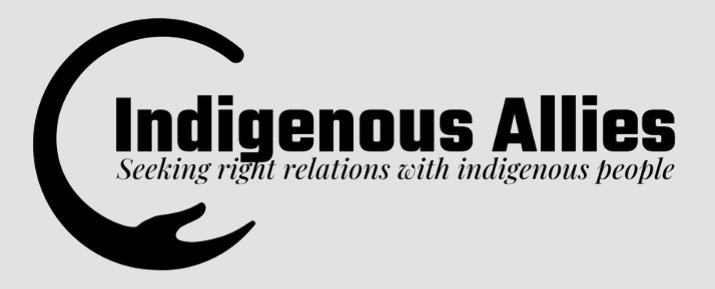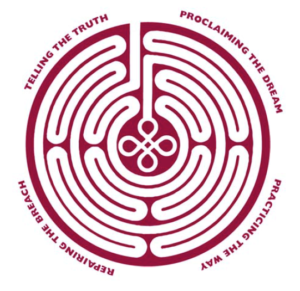Worship and Prayer
Worship unites us and helps empower us for the work of reconciliation. Consider incorporating Prayers for Reconciliation and Justice into your Sunday worship.
Welcoming Others
Radical Welcome: Embracing God, The Other, and the Spirit of Transformation by Stephanie Spellers is a guide for congregations wanting to move behind inclusivity to a place where “welcoming ‘The Other’ is taken seriously and where engaging god’s mission becomes more than just a catch-phrase.”
Recognizing and Remembering with a Land Acknowledgment
A land acknowledgment is truth-telling about what happened in our homeland years ago and how it affects the way we live today. A recognition of the Indigenous tribal people whose home was the land we now occupy. By doing so we remember them and begin to ask questions about what happened to them and why. A confession of how our church contributed to, or was complicit in, the process of colonization of the Indigenous peoples of the Western Hemisphere. An admission that while we are not responsible for what our ancestors did in the past, we are responsible for what we do today, knowing that the colonization process is still in place, and the effects of it are still felt by Indigenous people. An invitation to right relationship with Indigenous tribal people, particularly if the people still reside in the region. A recognition that Indigenous people currently live in all areas of this country, even if we do not see them. They are still here. A call to stand with Indigenous people in their myriad struggles to recover from the effects of genocide and enforced assimilation into the dominant society. An honoring of Indigenous people for their resilience, faithfulness, wisdom, and respect for the Earth and all of creation. A call to us to learn from their example. Read the land acknowledgement read at Annual Diocesan Convention 2023:
Welcome to The Episcopal Church in Colorado’s 137th Annual Convention. As we prepare for what the Spirit has for us this weekend, we take a moment to acknowledge that the land on which we live and gather is the traditional territory of the Arapaho, Cheyenne, and Ute Nations. We recognize the Indigenous people who once lived on this land and support the resilience and strength of their descendants living among us today.
We also acknowledge our complicity in the egregious acts of colonization, boarding schools, and genocide that have caused lasting intergenerational trauma. We commit to support the groups which are working toward healing in relationship with Indigenous people. We further commit to learn the truth of the past and present, to reckon with our role in the harms caused, and to stand in solidarity with our Indigenous kin as we seek an equitable future together.
Why is it important to have one? Why is a commitment part of it? For non-Indigenous communities, land acknowledgment is a powerful way of showing respect and honoring the Indigenous Peoples of the land on which we work and live. Acknowledgment is a simple way of resisting the erasure of Indigenous histories and working towards honoring and inviting the truth.
Indigenous Peoples have a special relationship with the land on which they have lived for generations, sometimes for tens of thousands of years. They possess crucial knowledge about how to manage natural resources sustainably and act as guardians or custodians of the land for the next generations.
Our commitment to concrete actions that represent our intentions Is especially important in light of the nearly 400 treaties signed by the United States and Native American tribes, virtually all of which were broken. Otherwise a land acknowledgement could be considered empty words by Natives and thus further damage the relationship.
Who wrote this one? This land acknowledgement was written by Indigenous Allies in collaboration with People of the Sacred Land. If you’d like to write your own, contact Indigenous Allies
Who can help us write one? Look at the Land Acknowledgement Guide
Indigenous Allies can walk you through the process.If you’d like to write your own, contact Indigenous Allies
Keeping the Conversation Going
A leadership team within your church can focus and guide the work of your congregation and encourage others. We recommend thoroughly exploring the Becoming Beloved Community resources as well as engaging your leadership in a Dismantling Racism Course. Following are workshops, practices, and curricula for carrying out the work of racial reconciliation.
Racism Through the Lens of White Privilege: A Spiritual Conquest (workshop)
A spiritual quest is the longing to become our true selves. This longing requires us to look deep within for hidden or rejected parts of ourselves. It is not comfortable to discover we are not who we thought we were. This is what happened to Rev. Jane E. Vennard when she came face to face with her white privilege. The purpose of this workshop is to explore white privilege as a way to know ourselves more fully and to explore racism with integrity.
Becoming Beloved Community
Becoming Beloved Community…Where You Are “is not a curriculum to be taught and completed, but a life-long way of being that promotes and helps us become Beloved Community.” The process is made up of four interwoven practices that invite reflection and action. Symbolically represented by a labyrinth, individuals and congregations can move from one to the next and back again:
- Telling the Truth: What racial/cultural/ethnic groups are in our church? Who have we excluded or included?
- Proclaiming the Dream: How has our city/town/area participated in racial injustice or healing over time? What’s happening today? What is our dream for Beloved Community? What behaviors and practices foster it?
- Practicing the Way: How will we grow as reconcilers, healers, and justice-bearers? What activities, practices, learning and experiences would (trans)form us? How will we share stories and grow relationship?
- Repairing the Breach: What institutions and systems bear the signs of racial injustice? How will we participate in the repair, restoration and healing of people, institutions and systems?
Each practice includes a recommended list of resources that can be explored in adult forums and study groups. For information about dialogue circles in the Episcopal Church in Colorado, contact Missioner Tracy Methe.
Dismantling Racism
The Diocese of Atlanta has developed the course Dismantling Racism, which is offered to diocesan and congregational leaders committed to bringing this work to their dioceses. Workshops are offered in the Diocese of Georgia, and workshop leaders are available to travel to Colorado. A version of Dismantling Racism is also available to youth leaders. It is made up of six lessons: Introduction and Covenant; God, the Artist; History of Racism in America: How we Got Here; White Privilege, Internalized Oppression; and Repentance, Healing, and Reconciliation. Youth leaders wishing to use the course with their youth must first participate in the Dismantling Racism adult curriculum and complete the youth course.
If you are interested in participating in a workshop in Colorado, please contact the formation team.
Soul 2 Soul Sisters
Soul 2 Soul Sisters calls itself “a fiercely faith-based, Black Womxn-led, racial justice organization focused on Black healing and Black liberation.” Soul 2 Soul provides resources for ending anti-black racism.
 Persevere in resisting evil, and whenever we fall into sin, repent and return to the Lord.
Persevere in resisting evil, and whenever we fall into sin, repent and return to the Lord. We acknowledge that the land on which we live and meet is the traditional territory of the Arapaho, Cheyenne, Ute, and many other peoples, in the foothills of the Rocky Mountains, in the watershed of Boulder Creek. We honor the Indigenous people who once lived on this land, and support the resilience and strength of their descendants living among us today. We lament that settlers on this land caused many harms to Indigenous people and to the land they hold as sacred.” We seek, through our work together, to establish right relationship, to learn the truth of the past and present, to reckon with our role in the harms caused, and to stand in solidarity with our Indigenous kin as we seek an equitable future together.
We acknowledge that the land on which we live and meet is the traditional territory of the Arapaho, Cheyenne, Ute, and many other peoples, in the foothills of the Rocky Mountains, in the watershed of Boulder Creek. We honor the Indigenous people who once lived on this land, and support the resilience and strength of their descendants living among us today. We lament that settlers on this land caused many harms to Indigenous people and to the land they hold as sacred.” We seek, through our work together, to establish right relationship, to learn the truth of the past and present, to reckon with our role in the harms caused, and to stand in solidarity with our Indigenous kin as we seek an equitable future together.
 “As the Episcopal branch of the Jesus Movement, we dream and work to foster Beloved Communities where all people may experience dignity and abundant life and see themselves and others as beloved children of God. The Becoming Beloved Community Vision Document and accompanying resources help us to understand and take up the long-term commitments necessary to form loving, liberating, and life-giving relationships with each other. Together, we are growing as reconcilers, justice-makers, and healers in the name of Christ.”
“As the Episcopal branch of the Jesus Movement, we dream and work to foster Beloved Communities where all people may experience dignity and abundant life and see themselves and others as beloved children of God. The Becoming Beloved Community Vision Document and accompanying resources help us to understand and take up the long-term commitments necessary to form loving, liberating, and life-giving relationships with each other. Together, we are growing as reconcilers, justice-makers, and healers in the name of Christ.”